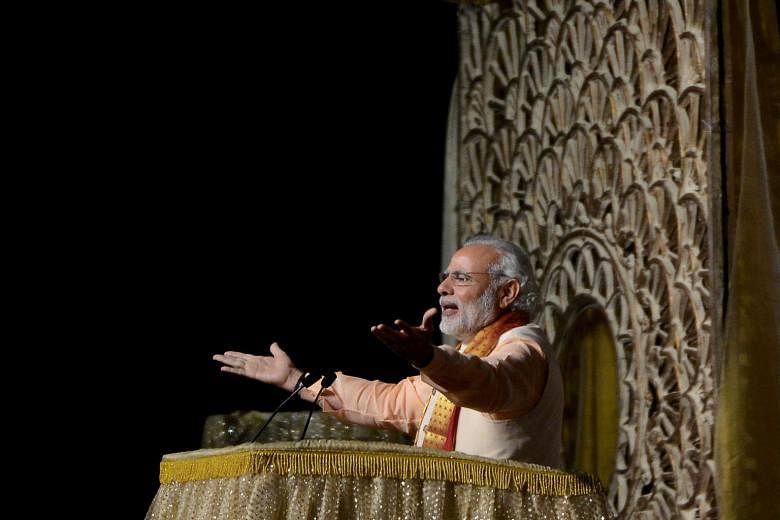Indian Prime Minister Narendra Modi took time off from his busy schedule to attend the World Culture Festival, where he praised spiritual guru Sri Sri Ravi Shankar and watched a song-and-dance extravaganza, highlighting the importance of India's holy men.
Mr Modi, who has made reviving rivers a priority, attended the event on the banks of the Yamuna river, despite criticism that its ecosystem would be affected by the massive stage set up for the event.
Political observers said his decision to attend the event last week, even though President Pranab Mukherjee pulled out after the National Green Tribunal fined organisers 50 million rupees (S$1.02 million), showed the desire of Mr Modi's Bharatiya Janata Party (BJP) to deeply cultivate spiritual gurus.
Mr Nilanjan Mukhopadhyay, the author of a biography on Mr Modi, said: "Modi went because it helps him to nurture his political constituency. By going to the event, he is not just addressing the Hindu community within the country, but also Hindus living outside."
He added: "It is a very calculated move. If he doesn't go, there is a risk that those who consider Sri Sri Ravi Shankar their guru might get offended." The country has hundreds of gurus, ranging from those with small followings to those whose massive numbers of acolytes include sports stars and actors.
In the past, some have also enjoyed political patronage.
Astrologer-turned-spiritual adviser Chandraswami became famous for his association with the late P.V. Narasimha Rao, a former prime minister from the Congress party, although the guru also faced allegations of financial irregularities.
Still, thanks to television and online media, the new age gurus are more powerful than ever. Some have even built business empires.
Baba Ramdev's Patanjali, for example, is being called India's fastest-growing consumer products company and is expected to double its revenue to 50 billion rupees this year, according to some estimates.
It makes everything from soap to instant noodles. In 2014, the yoga guru was given the government's highest level of security protection.
Recently, three dozen armed government commandos were deployed at his food park in the holy town of Haridwar, but at his expense.
Last year, he signed a deal with the Defence Research and Development Organisation to help the government agency manufacture and market food products.
According to reports, he was also allotted 243ha of land for an orange processing plant in the BJP-ruled state of Maharashtra.
The guru has been a staunch supporter of the BJP and had urged people to vote for Mr Modi in the 2014 elections.
Dr Sandeep Shastri, pro vice-chancellor of Jain University in Bangalore, said: "In some sense, (spiritual gurus) are natural allies in terms of (Hindu) ideology and beliefs... It's a comfortable and cosy alliance." Last year, the BJP even solicited the support of colourful spiritual leader Gurmeet Ram Rahim Singh for the elections in Delhi which was, however, won by the Aam Aadmi Party. BJP spokesman G.V.L. Narsimha Rao noted that "religious leaders have done a lot of good for humanity and done a great deal of human service".

